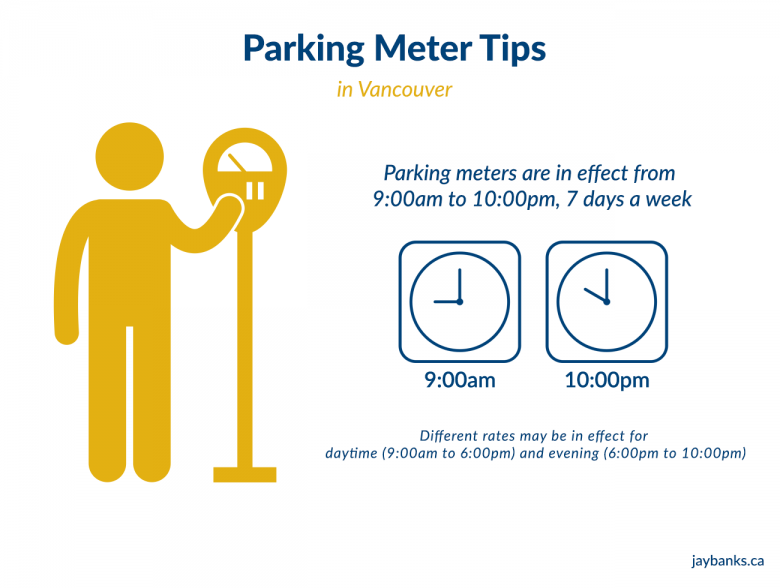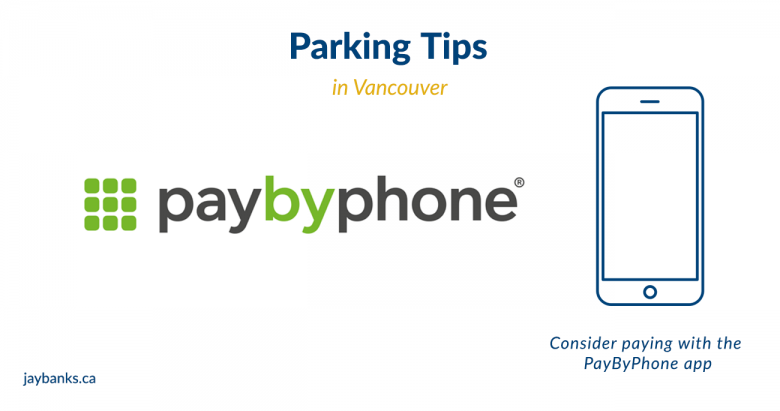ICBC says there were 1,376,000 passenger vehicle policies in the Lower Mainland in 2015. All of those cars and other vehicles need to be parked somewhere. A rule of thumb for land-use planning says that every car has one space at home and three or four other spaces waiting for it elsewhere. Yet there is only so much parking space available in Vancouver. There are a few tips on how to find free convenient parking in Vancouver, but drivers will probably have to use paid parking at some point.
Drivers need to be aware of the City’s rules and regulations when it comes to parking on city streets to avoid fines and upset neighbours. There are different rules depending on whether there are signs on the street or if you are at a meter. Many residents are unaware of the three-hour bylaw that states you cannot remain parked for more than three hours in front of a property you don’t own or live at. It is in effect between 8 a.m. and 6 p.m. daily.
Another regulation to pay attention to concerns parking near a fire hydrant; there must be at least five meters between the hydrant and the car.
Drivers are also not allowed to idle a vehicle for more than three consecutive minutes per hour or while there is no one in the vehicle and it is unlocked. Parking is also forbidden within 6 meters of the nearest edge of a sidewalk of an intersecting street, within 1.5 meters of an intersecting lane, private road, boulevard crossing, sidewalk crossing, or driveway, or within 5.5 m directly in front of private driveways, roads, and garage entrances. There are several other regulations about parking on the City website.
Tickets
Parking tickets may be paid at a 40 per cent discount within fourteen days. After thirty-five days, a fine is added to the ticket, and after sixty days the ticket goes to a collection agency, which may affect your credit rating. You can buy the tickets online or by phone with Visa, American Express or MasterCard, or by cheque or money order in person or by mail.
Time limited parking
Some parking spaces are time-limited, typically one or two hours, depending on demand. Time-limit parking spaces are indicated by street signs, which show the times and days when the restrictions apply.
Parking Meters
Other spaces have parking meters. The rates can vary depending on the location and time of day and you can pay with coins, a credit card, or a mobile app. All of the City’s parking meters run from 9 a.m. until 10 p.m. every day (including holidays).
Parking Apps
Drivers can use two major smart phone apps to help find and manage parking on Vancouver streets. The first app is Easy Park app, by a City-owned, not-for-profit parking company. Drivers can find lot locations, entrance locations and rates. You can also pay from your phone and extend your parking time when you are away from your vehicle. Find it on the Google Play and App Store.
The second app is Pay by Phone. It can be linked to your credit card and uses your license plate number to register your car for parking. It can be used at meters around Vancouver and also some lots. The app will send you a text message when the time is nearly done. Users can extend the time from the app. Pay by Phone is available for Apple, Android and Blackberry phones.
Accessible Parking
For travellers with disabilities, there are designated disabled parking zones and accessible parking meter spots throughout Vancouver. The City maintains a GoogleMap of accessible parking spaces, which can be used by vehicles with valid permits from the Social Planning And Research Council of BC (SPARC BC). You can apply for a SPARC permit at their website.
Other Alternatives
Other alternatives to cut down on parking problems include car-sharing, carpooling, and ride-sharing. There are several car-sharing cooperatives and businesses available in Vancouver, including Car2Go, Evo, Modo and Zipcar. Carpooling and ride-sharing can be done with friends and co-workers, or organized via services like the JackBell ride-share database.
Transit Options
There are alternate ways of getting around the city that don’t require parking. The City estimates about 50 per cent of trips are done by walking, cycling or using public transit. TransLink, the body in charge of the region’s public transportation, claims that 85 per cent of Metro Vancouver residents live less than 400 metres from a bus stop, which connects to the over 210 bus routes running around the city. Vancouver’s public transportation options include the Skytrain, which has the Expo Line running north-west to south-east and the Millennium Line that runs in a loop east to west. There is also the Seabus, which connects Waterfront Station downtown to Lonsdale Quay in North Vancouver, and HandyDART, a door-to-door service for people with disabilities.
Residential Parking
Some residential areas have restricted parking, which combines restricted parking for residents with time-limited and unregulated spaces for visitors. Residents with valid car insurance can buy annual parking permits online, by phone, or in person during business hours. You will receive a decal by mail, which you apply to your vehicle. This only applies if the decal matches the vehicle and the license plate of your vehicle. Depending on the area, the annual fee ranges from $38.93 to $77.90. Also, some areas allow a maximum of two permits per household.
The City also provides short-term and visitor parking permits, useful for guests, rental vehicles, and borrowed cars. You or your guest must apply in person at City Hall. (For the West End or Robson North zones only, apply at the West End Community Centre, 870 Denman Street.) Contractor permits cost $5.25 per day, while all other permits cost $10.50 per week.
Designers and architects should refer to the City’s parking bylaws, policies and guidelines.
Referendum Rejected
With an average of 870,000 vehicles on Metro Vancouver roads daily and just 10,000-metered parking spots plus about 17,550 at Easy Park lots the city faces a challenge.
Add to that the expectation that there will be 170,000 new residents by 2045 the City needs to advance a plan to ease the congestion. Because there is a shortage of land in Vancouver it is easier to make the transit system more efficient and more attractive rather than try and increase the available parking spots. This is the problem the Mayors Council Plan hopes to help by promising to reduce the traffic problem by 20 per cent.
The plan largely focuses on improving the region’s public transportation system including an expansion to the Millennium Line along Broadway from Commercial Drive and UBC. It will also add five new b-lines to the roughly 210 bus routes it already has. The new routes have been defined as:
- Downtown to SFU via Hastings Street;
- Downtown to SE Marine Drive via Victoria Drive and Commercial Drive;
- Downtown to Lynn Valley Centre in N Vancouver by West Georgia Street;
- Joyce-Collingwood Station to UBC along 41st Ave;
- Southeast Vancouver to Richmond and Burnaby via Knight Street.
The plan also commits to increasing sea bus service by 50 per cent.
However, residents essentially voted against funding the plan by rejecting a tax that would have covered the cost of the project in a 2015 referendum. Elections BC website records a total of 61.68 per cent of voters against the tax while 38.32 per cent supported it. Reports state the tax would have been a 0.5 per cent sales tax and revenue was expected to cover the $7.5 billion of in projects. It would have helped pay for some of the 10-year plan, which included an east-west subway line, a light rail system for Surrey that would reach to Langley and 11 new rapid bus lines in the suburbs, as well as a third harbour ferry.
Matt Taylor, a Master’s of Engineering Student at UBC has outlined the transportation problem in Vancouver in a YouTube video. He estimates there will be about 1,100,000 new residents in Vancouver. Which will mean an addition of 730,000 vehicles "at current ownership rates."
Taylor said that with that amount of growth the city would need an addition 2,200,000 more parking spaces. Due to the lack of land in the city, most of the spots would need to be built underground. At a cost of $40,000 per spot, Taylor said that would be a total cost of $90,000,000.
PT00KV










Thank you for this! Great resource and reminder.